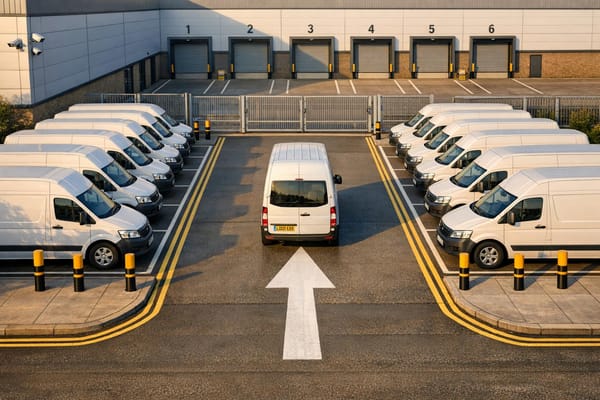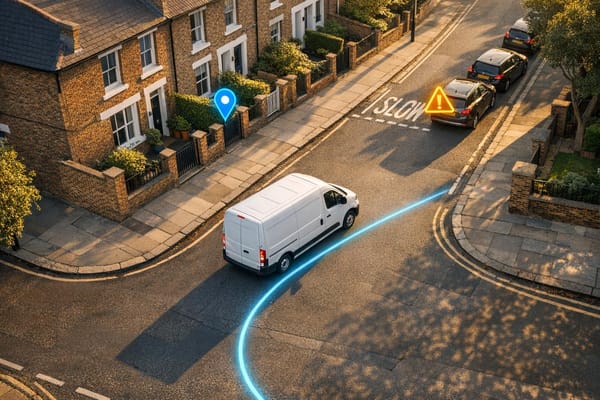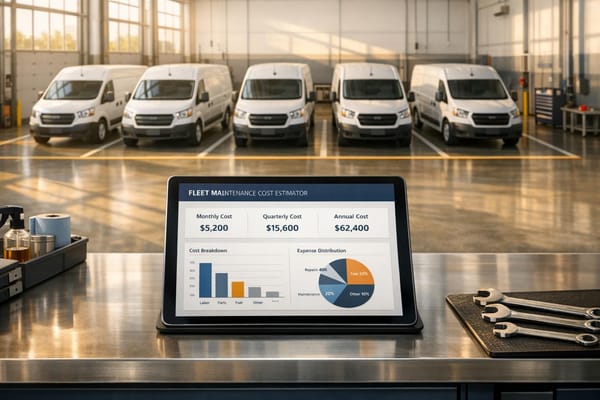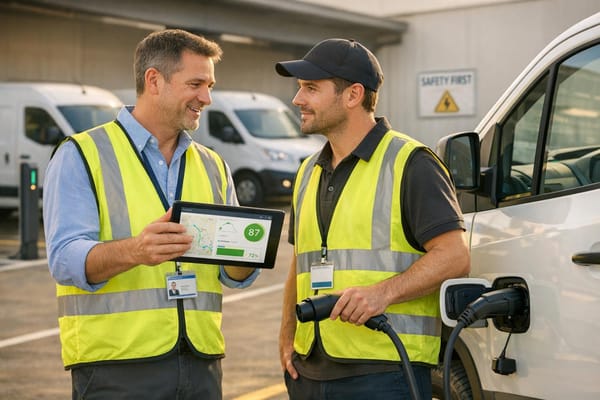Fleet Tracking Apps vs. Traditional GPS Systems
Explore the advantages of fleet tracking apps over traditional GPS systems, highlighting real-time insights, cost-efficiency, and enhanced security for UK businesses.
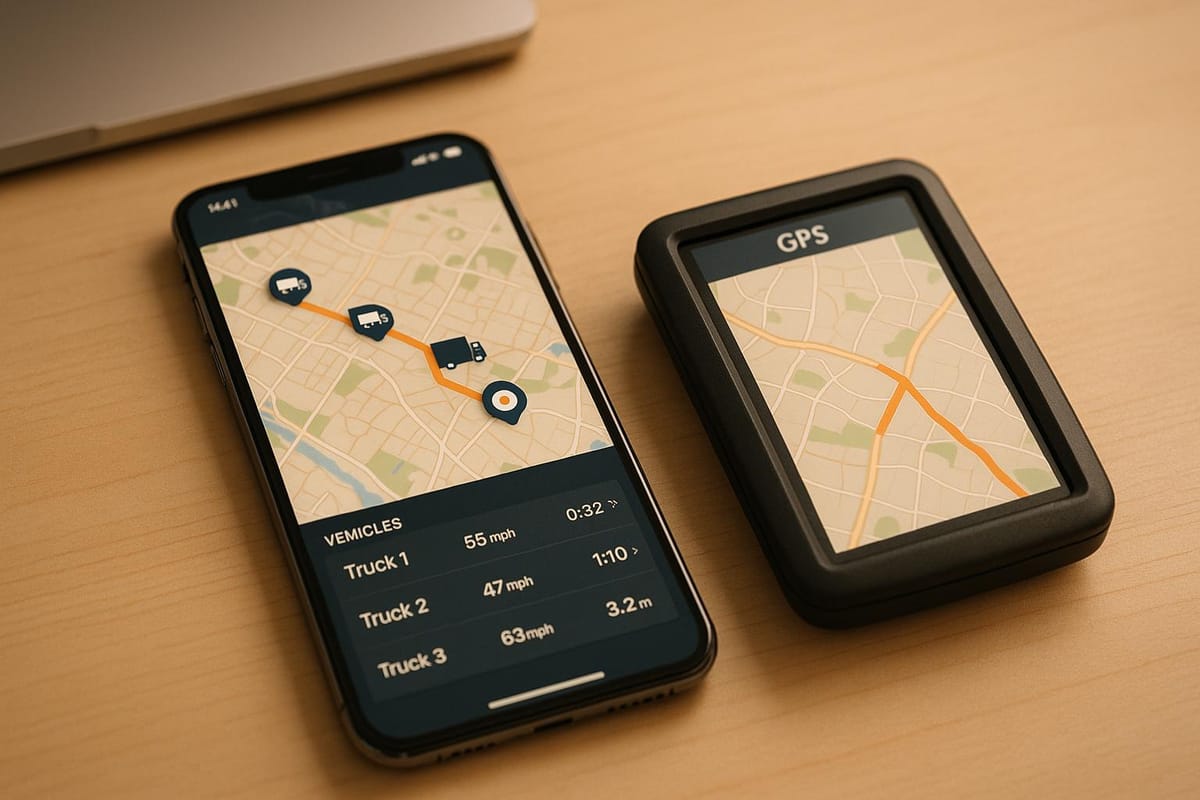
When managing vehicle fleets, businesses face a choice: modern fleet tracking apps or traditional GPS systems. Here's the key difference: fleet tracking apps offer more than just location tracking. They integrate tools like driver behaviour analysis, fuel tracking, and maintenance alerts, all accessible via mobile or web platforms. Traditional GPS systems, on the other hand, focus solely on basic location tracking with limited features.
Key Points:
- Fleet tracking apps: Cloud-based, real-time insights, advanced features (route optimisation, geofencing, diagnostics).
- Traditional GPS systems: Basic location tracking, hardware-dependent, fewer features.
Quick Comparison:
| Feature | Fleet Tracking Apps | Traditional GPS Systems |
|---|---|---|
| Real-time tracking | Detailed and advanced | Basic location display |
| Route planning | AI-based optimisation | Not available |
| Driver monitoring | Metrics for safety and costs | Limited to speed alerts |
| Maintenance tracking | Automated reminders | Manual processes |
| Installation costs | Lower, subscription-based | High upfront hardware costs |
Fleet tracking apps are better suited for businesses needing advanced tools, scalability, and UK regulation compliance. GPS systems work for basic needs but lack the flexibility of apps. The right choice depends on your fleet size, budget, and operational goals.
How Samsara's Vehicle Telematics Goes Far Beyond GPS Tracking
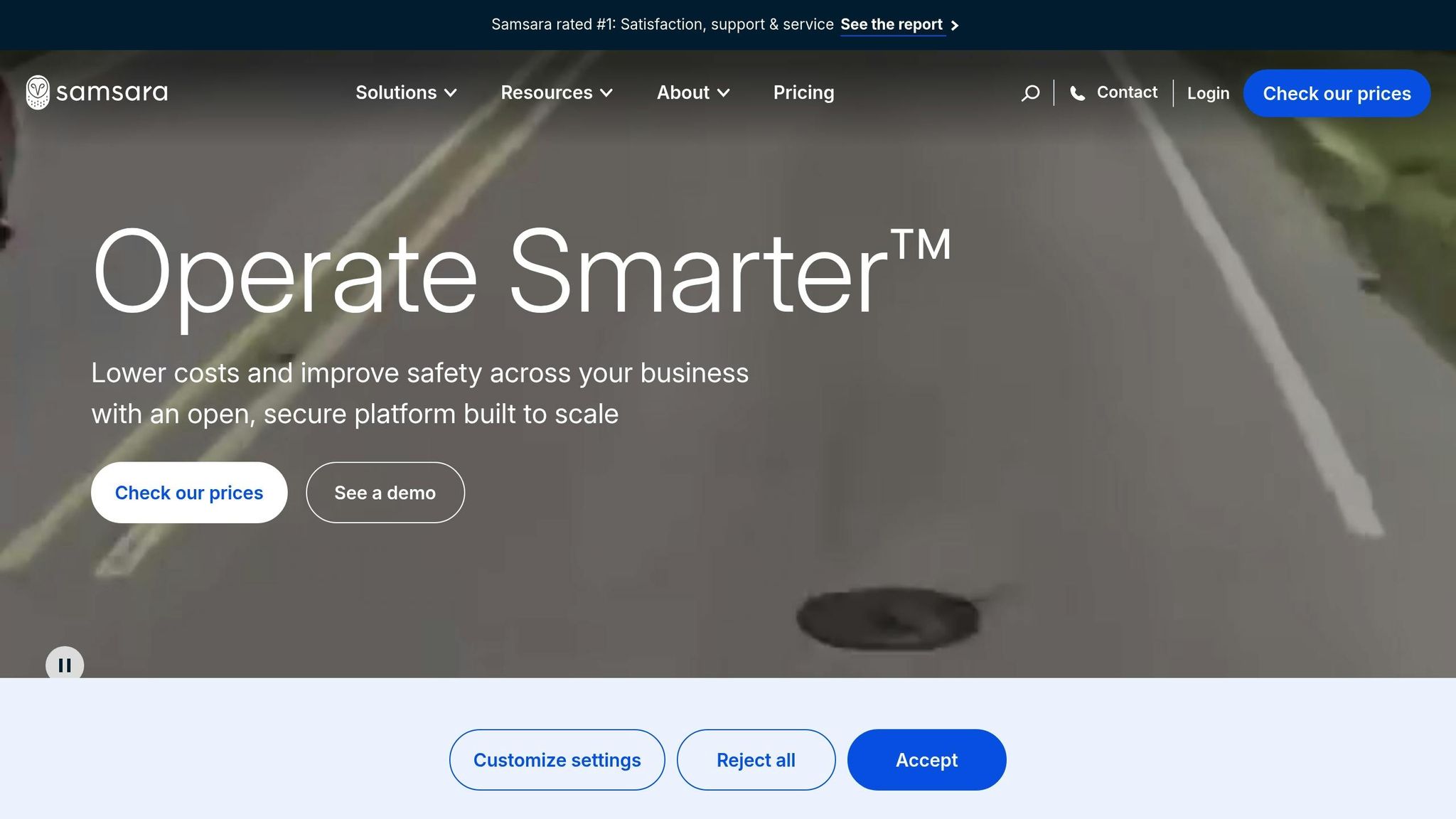
Feature Comparison
Understanding the capabilities of each technology is crucial for selecting the right fleet management solution. The gap between modern fleet tracking apps and traditional GPS systems goes far beyond simple location tracking. Below, we break down how these systems differ and how they impact fleet management.
Fleet Tracking App Features
Fleet tracking apps bring a wide range of benefits to fleet management in the UK. While real-time tracking is the cornerstone, these apps go beyond basic location updates to streamline multiple aspects of fleet operations.
- Geofencing: This feature lets you set up virtual boundaries around specific areas. You’ll receive instant alerts when vehicles enter or exit these zones. It’s especially handy for monitoring customer visits, ensuring drivers stick to approved routes, or securing vehicles after hours.
- Route optimisation: By calculating efficient, real-time routes, these apps help reduce fuel costs and improve delivery times. They consider factors like traffic conditions and delivery deadlines to ensure smooth operations.
- Driver behaviour monitoring: These systems track key metrics such as acceleration, braking, cornering, and speed limit compliance. This data not only highlights areas for driver training but can also lower insurance premiums by improving safety scores. Alerts for harsh driving events are sent immediately to managers.
- Vehicle diagnostics: Fleet tracking apps connect to a vehicle’s onboard systems to flag engine issues or maintenance needs early. This proactive approach minimises breakdowns and keeps vehicles reliable.
- Maintenance scheduling: These tools automate service reminders based on mileage, engine hours, or specific time intervals. They also track MOT dates, insurance renewals, and routine maintenance tasks, ensuring compliance with DVSA regulations.
GRS Fleet Telematics, for example, offers dual-tracker technology with a 91% recovery rate, immobilisation features, and 24/7 recovery support, all accessible via an easy-to-use dashboard.
Traditional GPS System Features
Traditional GPS systems, on the other hand, offer only basic functionality. Their main purpose is to answer a single question: where are your vehicles right now?
- Historical route data: These systems allow you to review past routes, but the information is often limited to basic breadcrumb trails with little to no analysis or actionable insights.
- Speed monitoring: While you can set alerts for speeding, the reporting capabilities are minimal, offering only basic notifications without deeper insights into driver behaviour.
Traditional GPS systems focus heavily on hardware, which limits their ability to integrate with other business systems. Features like engine diagnostics, fuel tracking, or detailed driver performance metrics are typically unavailable. Updates often require replacing hardware, making improvements both costly and infrequent.
Their user interfaces are functional but basic, often requiring extra training to navigate. Mobile access, when available, is usually limited and lacks the functionality of web-based platforms.
Feature Comparison Table
| Feature | Fleet Tracking Apps | Traditional GPS Systems |
|---|---|---|
| Real-time location tracking | ✅ Advanced with detailed mapping | ✅ Basic location display |
| Route optimisation | ✅ AI-powered multi-stop planning | ❌ Not available |
| Driver behaviour monitoring | ✅ Comprehensive scoring and alerts | ❌ Speed monitoring only |
| Vehicle diagnostics | ✅ Engine codes and maintenance alerts | ❌ Not available |
| Geofencing | ✅ Unlimited custom zones | ❌ Limited or not available |
| Mobile app access | ✅ Full-featured mobile platforms | ❌ Basic or limited functionality |
| Maintenance scheduling | ✅ Automated reminders and tracking | ❌ Manual tracking required |
| Fuel consumption tracking | ✅ Detailed fuel consumption data | ❌ Not available |
| Integration capabilities | ✅ Robust APIs and integrations | ❌ Limited integration options |
| Compliance reporting | ✅ DVSA-compliant automated reports | ❌ Manual compliance tracking |
| Theft recovery features | ✅ Immobilisation and recovery support | ❌ Location tracking only |
| Data analytics | ✅ Performance insights and trends | ❌ Basic historical data |
The table highlights the stark contrast between the two systems. Traditional GPS systems may suffice for basic tracking, but fleet tracking apps provide a comprehensive suite of tools tailored to meet the complex demands of modern UK businesses. These advanced features are essential for improving efficiency, reducing costs, and maintaining compliance in fleet management.
Cost and Growth Potential
For UK businesses, balancing initial investment with future growth is crucial. Traditional GPS systems often come with hefty upfront costs, including hardware, installation, software licences, map updates, and ongoing maintenance. In contrast, fleet tracking apps operate on subscription models, offering predictable costs and lower initial expenses.
Setup Costs and Monthly Fees
GRS Fleet Telematics provides three hardware options: Essential (£35), Enhanced (£79), and Ultimate (£99). Each vehicle also incurs a £7.99 monthly subscription fee, which covers platform access, data usage, support, and updates. This subscription-based model replaces large capital outlays with manageable monthly payments, a feature that becomes increasingly valuable as fleets grow.
Scaling for Larger Fleets
Expanding with traditional GPS systems can be cumbersome, as every new vehicle requires hardware installation and setup. Fleet tracking apps simplify this process - just install a tracking device and activate the subscription. Many providers also offer volume discounts, reducing per-vehicle costs as the fleet grows.
GRS Fleet Telematics exemplifies this flexibility. Its scalable approach includes white-label options and hardware configurations that suit various vehicle types, allowing businesses to standardise their tracking system without losing control over costs. Additionally, the pay-per-recovery model eliminates upfront recovery fees, boosting security without adding extra expenses at the start.
Performance, Security, and Compliance
Fleet tracking apps are transforming the way businesses manage their vehicles, offering smarter solutions for efficiency, security, and compliance through real-time data and cloud-based technology.
Fleet Performance
Fleet tracking apps shine when it comes to route optimisation. Using real-time traffic updates and advanced routing algorithms, these apps can adjust routes on the fly. This not only helps save fuel but also ensures deliveries stay on schedule, even during unexpected delays.
Another key feature is driver behaviour monitoring. By tracking actions like harsh braking, rapid acceleration, or speeding, managers can address unsafe practices immediately. This not only improves safety but also reduces fuel consumption and wear on vehicles. Alongside performance enhancements, these tools prioritise security.
Security Features
Vehicle security is a major concern for businesses across the UK. Many are turning to dual-tracker technology, which pairs a primary tracker with a backup that activates if the main device is compromised. This approach is proving highly effective. For example, GRS Fleet Telematics boasts an impressive 91% recovery rate for stolen vehicles, thanks to features like dual-trackers and remote immobilisation.
Traditional GPS systems, while useful, often rely on single-point tracking, making them more vulnerable to tampering or interference. Fleet tracking apps, on the other hand, take security up a notch with tools like geofencing alerts, instant theft notifications, and round-the-clock monitoring. Plus, they eliminate upfront recovery fees, making advanced security more accessible.
Meeting UK Regulations
Navigating the web of UK regulations can be daunting for fleet operators, but fleet tracking apps simplify the process. Whether it’s monitoring driver hours, tracking emissions, or meeting duty-of-care obligations, these tools automate much of the heavy lifting.
For example, they generate detailed reports for compliance with Clean Air Zone regulations in cities like London, Birmingham, and Bath. This not only saves time but also demonstrates a commitment to environmental responsibility, which is increasingly important for businesses.
Pros and Cons Comparison
| Aspect | Fleet Tracking Apps | Traditional GPS Systems |
|---|---|---|
| Performance | Real-time route adjustments, driver monitoring | Basic navigation with less detailed insights |
| Security | Dual-trackers, 91% recovery rate, immobilisation | Single-point tracking, more prone to tampering |
| Compliance | Automated reporting for regulations | Manual processes with fewer tools |
| Data Quality | Continuous real-time updates | Static data with occasional refreshes |
| Scalability | Quick setup, flexible hardware | Fixed capacity, complex installation |
| Limitations | Needs mobile connectivity, subscription fees | Offline functionality, no recurring costs |
Choosing the Right Solution for UK Fleets
Picking the best fleet tracking solution for your business isn't a straightforward decision. UK fleets need to weigh their specific needs and budgets against the features and benefits of various options.
What to Consider
Beyond just comparing features and costs, there are several key factors to keep in mind when making your choice.
Fleet size is a critical factor. Smaller fleets, with 5 to 20 vehicles, often find fleet tracking apps more appealing due to their flexibility and lower upfront costs. Meanwhile, larger fleets with 50 or more vehicles might initially lean towards traditional GPS systems. However, many are now realising that modern apps can scale just as effectively, without the hassle of complex installations.
Industry needs also play a big role. For example, construction companies working in remote areas often prioritise theft protection, such as dual-tracker technology. Delivery businesses, on the other hand, focus on route optimisation and real-time updates to improve customer communication. Service companies may place more importance on monitoring driver behaviour to uphold professional standards and reduce insurance costs.
Budget is another major consideration. While traditional GPS systems might seem cheaper at first, hidden expenses can quickly add up. Fleet tracking apps, in contrast, usually offer clear, subscription-based pricing that includes ongoing support and updates.
Regulatory compliance is becoming increasingly important. For fleets operating in Clean Air Zones, detailed emissions reporting is a must. Businesses with drivers working long hours also need automated tracking to ensure compliance with working time regulations. Fleet tracking apps often handle these requirements more smoothly than older systems.
Geographic coverage is another factor to think about. Urban fleets benefit from features like dynamic routing and real-time updates, while rural operations need reliable connectivity to ensure consistent performance.
These considerations highlight why many businesses are turning to modern fleet tracking apps.
Why Choose Fleet Tracking Apps
Modern fleet tracking apps address many of the limitations of traditional GPS systems, offering advanced features, competitive pricing, and reliable performance.
Cost-efficiency is a standout benefit. With hardware options ranging from £35 for basic tracking to £99 for advanced security features like immobilisation, these apps provide excellent value. Their proven recovery rates further increase their appeal by helping businesses reduce insurance claims and recover stolen vehicles.
Security performance is another key strength. The results speak for themselves - real vehicles are recovered, and businesses experience fewer losses and claims.
Scalability makes these apps ideal for growing businesses. Adding new vehicles is quick and straightforward, and the pay-per-vehicle pricing model ensures that costs remain predictable and manageable as your fleet expands.
Comprehensive support is often included as standard. Many app providers offer services like installation, ongoing technical support, and regular software updates. For instance, GRS Fleet Telematics includes free installation when you opt for their fleet branding services, showcasing how providers bundle services for added value.
Real-time capabilities give businesses the flexibility to adapt quickly. Whether it's rerouting around traffic, responding to theft alerts, or monitoring driver behaviour, these apps deliver the instant information needed to stay on top of fleet management.
Summary
This article explored the strengths and drawbacks of modern fleet tracking apps compared to traditional GPS systems, focusing on their relevance for UK businesses. While traditional GPS systems provide basic tracking capabilities, they fall short in delivering the real-time insights and integrated features now essential for effective fleet management. Additionally, their higher upfront costs can make them less practical for businesses looking to scale.
In contrast, modern fleet tracking apps go beyond simple location tracking, offering advanced features like detailed driver monitoring and enhanced security measures. These apps are designed to be both cost-effective and scalable, making them a more practical choice for growing businesses. For example, GRS Fleet Telematics utilises dual-tracker technology, boasting an impressive 91% recovery rate, showcasing the effectiveness of these modern solutions.
FAQs
What benefits do fleet tracking apps offer over traditional GPS systems for businesses in the UK?
Fleet tracking apps offer UK businesses real-time vehicle tracking, giving them better oversight and control of their operations. With features like instant alerts on driver behaviour, route performance, and vehicle condition, these tools can play a key role in improving safety and cutting costs.
What sets fleet tracking apps apart from traditional GPS systems is their ability to do more than just track location. They enable route planning, provide detailed insights into vehicle activity, and create automated reports. These capabilities allow businesses to save on fuel, keep maintenance schedules on track, and boost overall efficiency - all while being a more budget-friendly option.
How do fleet tracking apps improve vehicle security compared to traditional GPS systems?
Fleet tracking apps boost vehicle security by providing real-time tracking and incorporating anti-tampering technology. Many of these systems use tamper-resistant devices installed by professionals, making them difficult to disable or remove. This added layer of protection helps to minimise the risk of theft.
What sets modern fleet tracking apps apart is their ability to send instant alerts if a vehicle is moved without authorisation or if tampering is detected. This ensures businesses can act quickly to address potential threats. Compared to traditional GPS systems, which often lack these features, fleet tracking apps offer a more dependable way to protect vehicles.
What should UK businesses consider when choosing between fleet tracking apps and traditional GPS systems?
When deciding between fleet tracking apps and traditional GPS systems, UK businesses need to weigh several key factors. Real-time tracking, data precision, and compatibility with fleet management tools are critical elements to consider. Modern apps often go beyond basic tracking, offering features like automated reports and live updates, which can boost both efficiency and safety.
Cost is another crucial aspect. Fleet tracking apps often come with flexible pricing options, making them suitable for businesses of all sizes. It's also essential to evaluate the system's reliability across varying geographical conditions and ensure it complies with UK regulations. Choosing a solution tailored to your operational needs can have a significant impact on improving fleet management.

